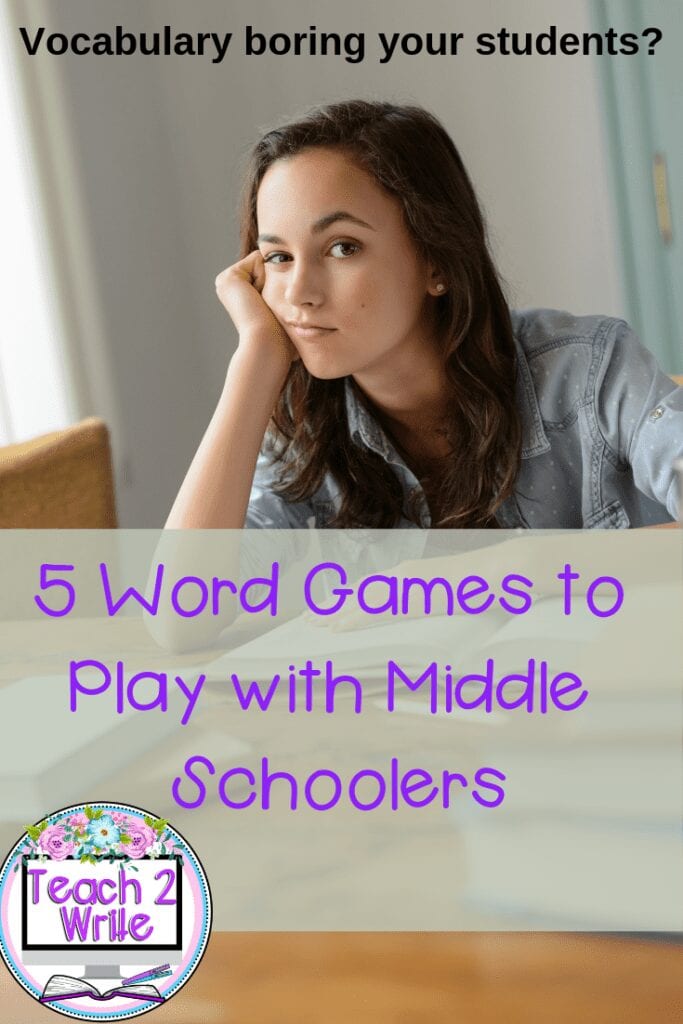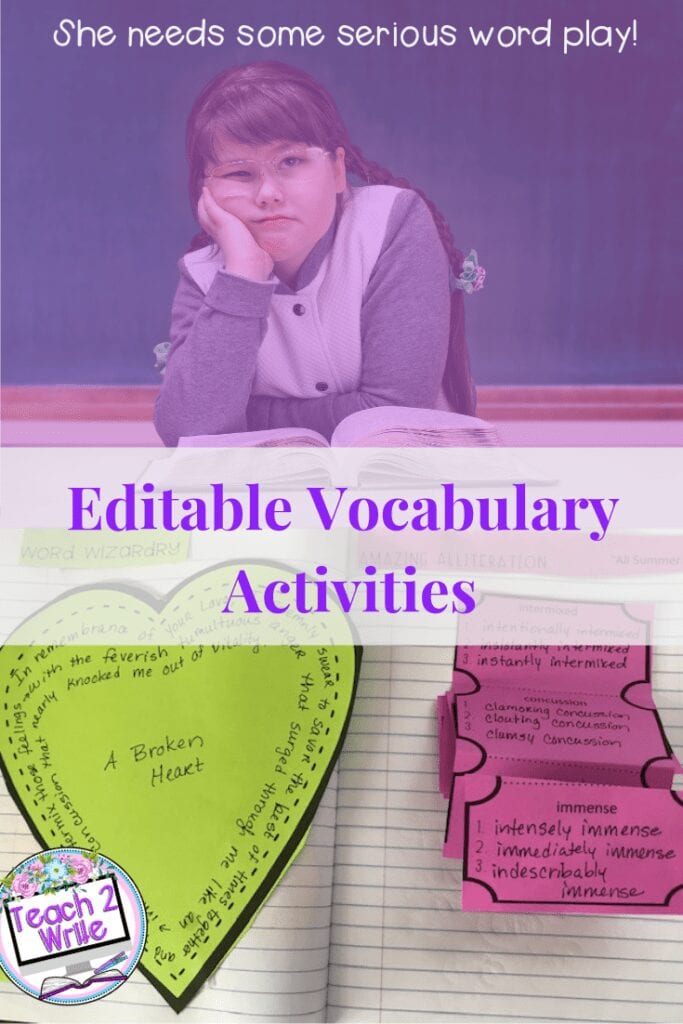Vocabulary word games to play with middle schoolers- Word Work, Vocabulary Diction. All of these terms make learning new words so borrring! That’s why these 5 word games to play with middle schoolers will make your ELA class a lot more engaging.

The Power of Words and Games
When I think about words, I think about their power. I think about how words help us to express ourselves. I think about the types of stories and poetry I can create using these words.
As a writer, I think about how I like to play with words. I think about how I like to put together words into different combinations like alliterations or metaphors or even oxymorons. So when, I think about teaching kids vocabulary, I really think about teaching them how to play with words. As a teacher, I feel that when we teach our kids the magic of word choice, students learn the power of clarity.
Kids love to play games. So when I teach vocabulary, I try to think of as many word games to play with middle schoolers as I can. Word study takes a lot of repetition just like any other type of learning. So, if we can make learning new words fun for our kids, they learn to love words as much as we do.
Word Game 1: Act out the words
One word game to play is to get students to pair up and act out the words. One partner acts out the word, and the other partner tries to guess what the word is. They record each word they guess correctly on a worksheet or in a form on Google drive. This makes students accountable while they play with words.
Once they have practiced with one partner, they can switch to a different partner, and do all the words again. (Usually, I have students work on 5-10 new words per week.)
By using more than one sense of seeing and saying the word or just reading the word, the students are activating their amygdala, which controls part of the pleasure center of the brain. Coming up with hand motions or actions is fun, awkward and will lead to a lot of noise, but students will be learning words faster and easier. Make sure students know what you want them to do, and you set a time limit. This will be a productive lesson, and it can also build a positive classroom community.
Word Game 2: Describe the word using the 5 senses
Another word game to play with middle schoolers is through description. Have students write their word, and try to describe it using the five senses. For example, for the word “occurrence,” the student would think about an event that happened to them and use the five senses to describe this occurrence. They should use the word about three times at least in their description. This may be repetitious, but it helps them to think about ways to use the word “occurrence” in sentences.
A variation of this word game might be to have the students describe the word using the five senses without using the word in the paragraph. Then, a partner has to guess what the word is. Do a couple of words a day with this, not all of them.
Word Game 3: The Mirror Game
In this word game, you facilitate the learning of the new words. Introduce a new word and give it a hand signal or action. Then, have students mirror what you say and do. Get them to practice this word, its signal and definition over and over again for 30 seconds as they mirror you. Then, have them practice the same word with a partner, mirroring each other.
Once students have practiced this for 30 seconds, go onto a new word. I learned this technique from Chris Biffle and Whole Brain Teaching. Middle schoolers often feel silly doing this, so it’s important that everyone is doing it and that you laugh along with them. Tell them that it is okay to laugh and that by participating they will all get 100s on their next vocabulary test. You could even give them a pretest first, so they can see the improvements they make after playing this game. I use this often, click on this blog post to see how I used it with Black Ships Before Troy.
Word Game 4: Quizzers and Quizzees
This word game for middle schoolers will have them lining up. I use either a double line up or inside-outside circle. One line of students (or the outer circle) will be what I call the “Quizzees.” The other line of students or the inner circle will be the “Quizzers”.” move when you yell, “Switch,” which signals them to switch partners. The other line stays put. The line that does not move are called the “Quizzers.” They give the word to the moving line, whom I call the “Quizzees.” Quizzees tell what the word means and uses it in a sentence. Let students do this for four or five words before you yell “switch” and the moving line moves down one person. The Quizzers keep giving the words on the list. After the line of students has gotten back to their original partners, have the “Quizzees” become the “Quizzers.”
Word Game 5: Alliteration Agility
Yes, I just made that Vocabulary word game to play with students – Word Work, Vocabulary Diction. All of these terms make learning new words so borrring! That’s why these 5 word games to play with middle schoolers will make your ELA class a lot more engaging. up for this game, right now, as I am writing this. I used a word list of nouns that start with “a” to help me out. However, we can have students do the same thing with new words. What two words could be paired together with alliteration and still make sense? You have to be pretty agile to do that!
Put students in two teams, have them write as many alliterative pairs that make sense as they can on the board. You could even have them do a relay race, where students of each team have to pass on the marker to someone else on their team who is waiting in line. The other team mates could be looking up alliterative pairings. You could also do this same activity with rhyming words.

For more word games to play with middle schoolers and EDITABLE vocabulary activities for interactive notebooks or learning centers, click here in my TPT store.

